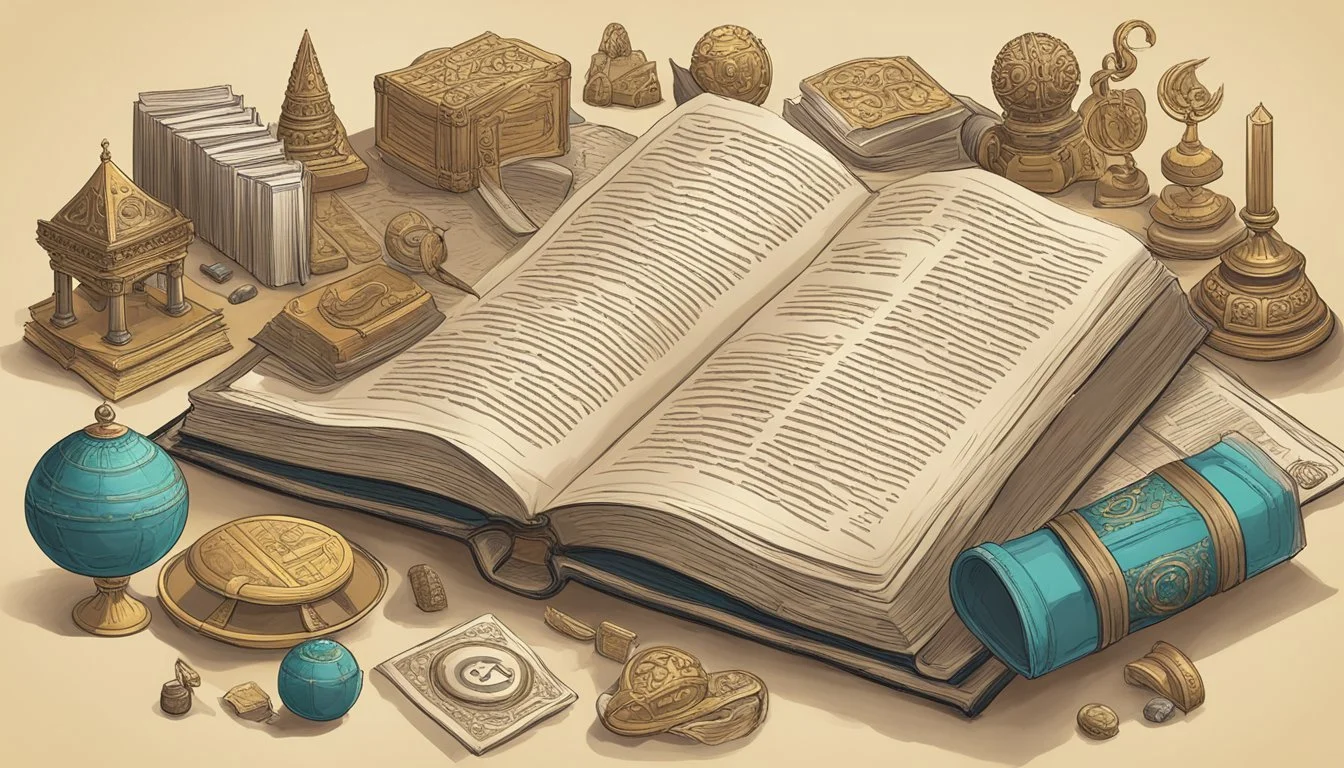7 Ancient Philosophies That Will Change Your Life
Timeless Wisdom for Modern Living
Ancient philosophies have endured through millennia, offering timeless insights into human nature and the pursuit of a meaningful life. These age-old teachings continue to resonate with modern audiences, providing guidance on how to navigate the complexities of existence and find fulfillment in an ever-changing world.
By exploring and applying ancient philosophical principles, individuals can gain new perspectives on personal growth, ethical decision-making, and the cultivation of inner peace. From the wisdom of Greek thinkers to the teachings of Eastern sages, these philosophies offer practical tools for self-improvement and a deeper understanding of life's fundamental questions. The following exploration delves into seven ancient philosophies that have the power to transform one's outlook and approach to daily living.
1) Stoicism
Stoicism is an ancient Greek philosophy that emphasizes living in accordance with reason and virtue. It teaches individuals to focus on what they can control and accept what they cannot.
Stoic practices include self-discipline, cultivating wisdom, and maintaining emotional equilibrium in the face of adversity. The philosophy encourages people to develop inner strength and resilience.
Key Stoic thinkers include Epictetus, Marcus Aurelius, and Seneca. Their writings continue to influence modern thought and personal development.
Stoicism promotes the idea that true happiness comes from within, not from external circumstances or possessions. It advocates for living in harmony with nature and accepting life's challenges with grace.
The philosophy emphasizes the importance of ethical behavior and moral character. Stoics believe in treating others with fairness and respect, regardless of their status or background.
Practicing Stoicism can lead to increased mental clarity, reduced stress, and improved decision-making. It provides a framework for navigating life's ups and downs with equanimity.
2) Epicureanism
Epicureanism, founded by the Greek philosopher Epicurus in the 4th century BCE, promotes the pursuit of happiness through simple living and cultivating meaningful relationships. This ancient philosophy emphasizes the importance of pleasure as the highest good, but not in the hedonistic sense many assume.
Epicureans believe that true happiness comes from freedom from pain and fear, rather than indulgence in excessive physical pleasures. They advocate for moderation in all aspects of life, including food, drink, and material possessions.
At its core, Epicureanism encourages individuals to focus on cultivating friendships and building strong communities. These social bonds are seen as essential for personal well-being and contentment.
The philosophy also promotes a rational approach to understanding the natural world. Epicureans reject superstition and divine intervention, instead embracing a materialistic view of the universe.
By adopting Epicurean principles, one can learn to find joy in life's simple pleasures and develop a more balanced, fulfilling existence. This ancient wisdom continues to resonate with many people seeking a path to genuine happiness in today's fast-paced world.
3) Taoism
Taoism is an ancient Chinese philosophy that emphasizes living in harmony with the Tao, or the natural flow of the universe. It originated over 2,000 years ago and has profoundly influenced Chinese culture and spirituality.
At the core of Taoist thought is the concept of wu wei, often translated as "non-action" or "effortless action." This principle encourages individuals to align themselves with the natural rhythms of life rather than forcing their will upon the world.
The philosophy recognizes the interplay of opposites, symbolized by the familiar yin and yang symbol. This represents the balance and cyclical nature of existence, where seemingly contrary forces are interconnected and complementary.
Taoism teaches the importance of simplicity, spontaneity, and returning to one's true nature. It suggests that by letting go of desires and attachments, one can find peace and contentment.
The Tao Te Ching, attributed to Lao Tzu, is the primary text of Taoism. It contains poetic wisdom and practical advice for living in accordance with the Tao.
By embracing Taoist principles, individuals may cultivate a sense of inner calm, improve their relationships with others, and develop a deeper connection with the natural world.
4) Confucianism
Confucianism is an ancient Chinese philosophy founded by Confucius in the 6th-5th century BCE. It emphasizes personal and governmental morality, correctness of social relationships, justice, and sincerity.
At its core, Confucianism promotes the cultivation of virtue and the development of moral character. It teaches that individuals should strive for self-improvement and social harmony through ethical behavior.
The philosophy places great importance on education and the pursuit of knowledge. Confucius believed that learning was essential for personal growth and societal progress.
Filial piety, or respect for one's parents and ancestors, is a fundamental principle in Confucian thought. It extends to respecting elders and authority figures in society.
Confucianism advocates for the concept of "ren," which encompasses benevolence, humaneness, and compassion. This principle encourages individuals to treat others with kindness and empathy.
The philosophy also emphasizes the importance of ritual and proper conduct in maintaining social order. It teaches that by following established customs and norms, individuals can contribute to a harmonious society.
Confucian ethics continue to influence Chinese culture and other East Asian societies today, shaping social values, educational systems, and governmental structures.
5) Hedonism
Hedonism is a philosophy that posits pleasure as the highest good and ultimate aim in life. It originated in ancient Greece, with the Cyrenaic school founded by Aristippus of Cyrene in the 4th century BCE.
Hedonists believe that pursuing pleasure and avoiding pain should guide our actions and decisions. This philosophy emphasizes the importance of enjoying life's pleasures in the present moment.
Critics often misunderstand hedonism as a pursuit of shallow or harmful pleasures. However, many hedonist thinkers advocate for a more nuanced approach, focusing on long-term satisfaction and well-being rather than short-term gratification.
Epicurus, a prominent Greek philosopher, developed a refined version of hedonism. He argued that the greatest pleasure comes from living a simple life, cultivating friendships, and pursuing knowledge.
Adopting aspects of hedonism can lead to a more enjoyable and fulfilling life. It encourages people to prioritize their happiness and well-being, while also considering the long-term consequences of their actions.
Modern interpretations of hedonism often incorporate elements of ethical considerations and personal growth. This approach seeks to balance the pursuit of pleasure with responsibility and self-improvement.
6) Skepticism
Skepticism emerged as a philosophical school in ancient Greece, emphasizing the importance of doubt and critical thinking. Its adherents questioned the possibility of attaining certain knowledge about reality.
Pyrrho of Elis, considered the father of Skepticism, advocated for suspending judgment on matters beyond human perception. This approach aimed to achieve a state of mental tranquility by avoiding dogmatic beliefs.
Academic Skepticism, associated with Plato's Academy, challenged the certainty of knowledge claims. Arcesilaus, a key figure in this tradition, used skeptical arguments to counter dogmatic assertions from other schools of thought.
Practicing skepticism can lead to a more open-minded and reflective life. By questioning assumptions and examining beliefs critically, individuals may develop a deeper understanding of themselves and the world around them.
Skeptical thinking encourages intellectual humility and the willingness to revise opinions in light of new evidence. This flexibility of mind can be valuable in navigating the complexities of modern life.
The skeptical approach also promotes tolerance for diverse viewpoints. By recognizing the limitations of human knowledge, skeptics may be more inclined to consider alternative perspectives.
7) Neoplatonism
Neoplatonism emerged in the 3rd century AD as a philosophical school of thought. It built upon Plato's ideas, emphasizing the concept of a single, supreme principle called "the One."
This philosophy proposed that all reality stems from this ultimate source. Neoplatonists believed in a hierarchical structure of existence, with the material world at the bottom and the One at the top.
The goal of Neoplatonism was to achieve union with the One through contemplation and spiritual practices. This pursuit involved turning inward and transcending the physical world.
Plotinus, a prominent Neoplatonist, developed the concept of emanation. He argued that everything flows from the One, like light from the sun, creating different levels of reality.
Neoplatonism influenced various religious and philosophical traditions. It shaped early Christian theology and played a role in the development of mystical practices.
The philosophy offered a way to understand the relationship between the divine and the material world. It provided a framework for exploring the nature of existence and human consciousness.
Neoplatonism's ideas about the soul and its journey towards unity with the divine continue to resonate with some spiritual seekers today.
Historical Context of Ancient Philosophies
Ancient philosophies emerged as systematic attempts to understand the world and human existence. These schools of thought laid the foundation for modern philosophical inquiry and continue to influence contemporary thinking.
Origins and Early Development
Ancient Greek philosophy began in the 6th century BCE. Early thinkers like Thales of Miletus sought natural explanations for phenomena previously attributed to gods. This marked a shift from mythological to rational thinking.
The Pre-Socratic philosophers focused on cosmology and the nature of reality. They proposed various theories about the fundamental substance of the universe.
Socrates redirected philosophical inquiry towards ethics and human behavior. His method of questioning beliefs and assumptions revolutionized critical thinking.
Plato and Aristotle further developed systematic philosophical frameworks. Their ideas on metaphysics, ethics, and politics shaped Western thought for centuries.
Influence on Modern Thought
Ancient Greek philosophy profoundly impacted subsequent intellectual traditions. Roman thinkers adapted and built upon Greek ideas, spreading them throughout their empire.
During the Renaissance, rediscovered ancient texts sparked renewed interest in classical philosophy. This revival influenced the development of modern science and political theory.
Key concepts from ancient philosophy continue to shape contemporary debates. Ethics, logic, and metaphysics remain central to philosophical discourse.
Ancient philosophical methods, like Socratic questioning, are still used in education and critical thinking. Law schools employ this technique to develop students' analytical skills.
Many modern philosophical movements trace their roots to ancient ideas. Existentialism, for instance, echoes Socratic emphasis on self-examination and the pursuit of meaning.
Core Concepts of Transformative Philosophies
Ancient wisdom offers profound insights that can revolutionize modern lives. These philosophies emphasize self-awareness, ethical behavior, and finding equilibrium in all aspects of existence.
Mindfulness and Awareness
Mindfulness stands at the heart of many ancient philosophical traditions. It involves being fully present in the moment and observing thoughts without judgment. This practice enhances self-understanding and reduces stress.
Meditation serves as a key tool for developing mindfulness. Regular meditation can improve focus, emotional regulation, and overall well-being. Ancient philosophers often emphasized the importance of self-reflection and introspection.
Awareness extends beyond the self to encompass the interconnectedness of all things. This broader perspective can lead to greater empathy and compassion for others.
Ethics and Virtue
Ancient philosophies place significant emphasis on ethical living and the cultivation of virtues. These systems provide guidelines for moral behavior and personal growth.
Virtues such as wisdom, justice, courage, and temperance feature prominently in many philosophical traditions. Developing these qualities is seen as essential for a fulfilling life.
Ethical frameworks often stress the importance of integrity and consistency between thoughts and actions. This alignment fosters inner peace and harmonious relationships with others.
Philosophical teachings frequently highlight the role of personal responsibility in ethical behavior. They encourage individuals to consider the consequences of their actions on themselves and society.
Balance and Harmony
Ancient philosophies often advocate for balance and harmony in all aspects of life. This principle applies to personal habits, relationships, and interactions with the natural world.
The concept of moderation is central to many philosophical traditions. It involves avoiding extremes and finding a middle path in behaviors and attitudes.
Harmony with nature is another key theme. Many ancient teachings emphasize the importance of living in accordance with natural rhythms and respecting the environment.
Balancing different aspects of life, such as work and leisure, or material and spiritual pursuits, is seen as crucial for overall well-being. This holistic approach promotes a sense of completeness and fulfillment.




